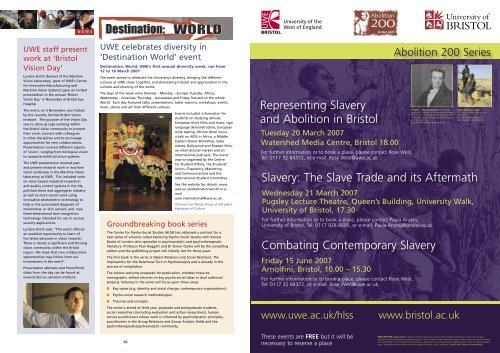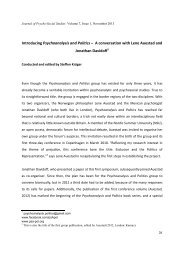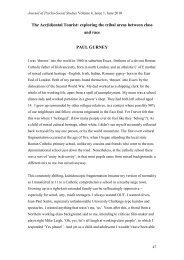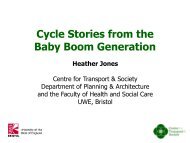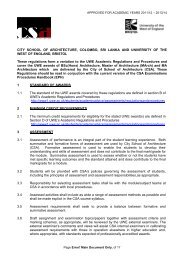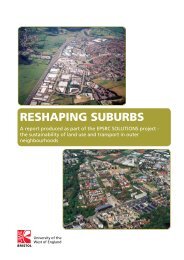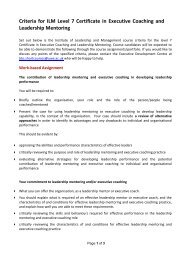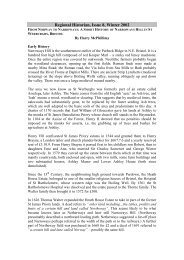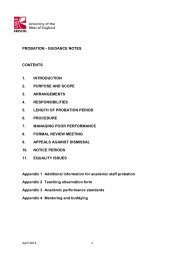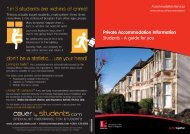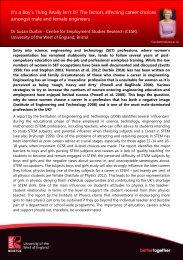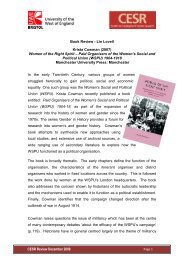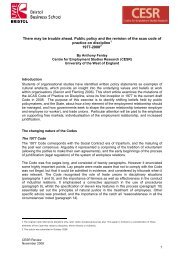UWE cuts gas useby over halfN E W SThe <strong>University</strong> has made great progressin cutting gas use on <strong>the</strong> FrenchayCampus. In <strong>the</strong> second half <strong>of</strong> 2001 <strong>the</strong>non residential part <strong>of</strong> <strong>the</strong> <strong>University</strong>site used 6.5 million kilowatt hours <strong>of</strong>gas, in <strong>the</strong> same period for 2006 this fellto 3 million kilowatt hours, a reductionin gas use <strong>of</strong> 54 per cent.Mark Bagnall, Principal Engineer in<strong>the</strong> Estates Department says, “Wehave certainly benefited from <strong>the</strong> mildautumn this year, but <strong>the</strong> key factorsin reducing gas consumption for <strong>the</strong><strong>University</strong> have been a significant capitalinvestment in new condensing boilers,an innovative boiler control philosophyand tighter housekeeping. The capitalinvestment was supported with a grantfrom <strong>the</strong> Higher Education FundingCouncil for <strong>England</strong>”.“The <strong>University</strong> has made steadyprogress over <strong>the</strong> last few years toplace it at about halfway among similarinstitutions in terms <strong>of</strong> its energy usebut this year’s improvement shouldmean that UWE is close to <strong>the</strong> top<strong>of</strong> energy efficient tables for largeruniversities.”The overall 54 per cent savings equateto 665 tonnes <strong>of</strong> carbon, or over£100k at today’s prices. The EstatesDepartment has made energy reductiona key target in existing buildings andfor new developments. UWE is part <strong>of</strong><strong>the</strong> EU Emissions Trading Scheme andhas consistently saved on <strong>the</strong> number <strong>of</strong>permits that it has to surrender for <strong>the</strong>consumption <strong>of</strong> gas and oil.UWE’s reduction in gas consumptionis just one <strong>of</strong> a number <strong>of</strong> ongoinginitiatives which are aimed at ‘greening’<strong>the</strong> <strong>University</strong>. These include for exampleachieving Fair Trade status, a majorinvestment in staff and student car sharescheme, and switching to recycled paperfor its prospectuses and o<strong>the</strong>r printedmaterial as well as achieving a 29 percent recycling rate for <strong>the</strong> academicyear 2005/06. UWE is also developing<strong>the</strong> process <strong>of</strong> an EnvironmentalManagement System (ISO14001) to fullyintegrate environmental managementinto <strong>the</strong> day to day operation <strong>of</strong><strong>the</strong> <strong>University</strong> to ensure continualimprovement.UWE helps streamline learningdisability charity Brandon TrustUWE and <strong>the</strong> Brandon Trust have been awarded a high grade for improving <strong>the</strong>charity’s efficiency under <strong>the</strong> Department <strong>of</strong> Trade and Industry’s KnowledgeTransfer Partnership (KTP) scheme.The Trust, which provides residential, day and supported living services for peoplewith learning disabilities, called in experts from Bristol Business School to helpdevelop robust and effective staff, service and finance management systems. TheTrust has grown rapidly over <strong>the</strong> past 12 years, and now has 1,400 staff providingcare and support to over 1300 individuals at 100 locations, in Gloucestershire and<strong>the</strong> former county <strong>of</strong> Avon and Cornwall.The two year project, supported by a grant from <strong>the</strong> DTI, was led by IT graduateAbid Mohammed, who worked closely with Hilary Pearce, Brandon’s Director <strong>of</strong>Finance and Stephen Batty from Bristol Business School. Among <strong>the</strong> results for <strong>the</strong>charity were improved cross-departmental communications; integration <strong>of</strong> HR,payroll and finance systems, improved staff rostering and a reduction in paperworkand administrative duplication.Following <strong>the</strong> success <strong>of</strong> <strong>the</strong> project, Abid is continuing to work with <strong>the</strong> Trust as<strong>the</strong>ir Business Systems Manager. The Trust is also sponsoring him to study for hisMBA at UWE.Brandon’s Chief Executive Lucy Hurst-Brown commented, “This was an ambitiousproject and we are absolutely delighted with <strong>the</strong> recognition from <strong>the</strong> DTI for all<strong>the</strong> hard work that Brandon and UWE put in over <strong>the</strong> last two years. These newstreamlined systems will support Brandon as we move forward with our objectivesfor improving services to <strong>the</strong> people we help under our ‘Unique Futures’ plan.”Dean <strong>of</strong> Bristol Business School, Warwick Jones, said, “We are especially pleasedthat this project was such a success, as it represents an excellent example <strong>of</strong>knowledge exchange between UWE and local organisations. UWE has gainedvaluable real examples <strong>of</strong> how business re-engineering <strong>the</strong>ory can benefit a largecomplex charity and this will feed back into our research and teaching”.For more information on KTPs e-mail clare.rowson@uwe.ac.uk; telephone 0117 3283673.Abid Mohammed and Hilary Pearce <strong>of</strong> <strong>the</strong> Brandon TrustKTP Regional SeminarThe <strong>2007</strong> South <strong>West</strong> Regional Knowledge Transfer Partnership Seminar willbe hosted by UWE at Bristol Zoo on 10 May. Included in <strong>the</strong> programmeare presentations from graduates working on current programmes and talksrelevant to all those interested in Knowledge Exchange activities.The event is open to all and more information can be obtained by e-mailingktp@uwe.ac.uk.UWE and <strong>the</strong> diamond jubilee <strong>of</strong> Bristol’s twinnings<strong>2007</strong> marks <strong>the</strong> 60th anniversary <strong>of</strong> <strong>the</strong> Bristol-Hannover and Bristol-Bordeaux city twinnings,and a year <strong>of</strong> events was launched on 27 January by <strong>the</strong> Lord Mayor, Councillor Peter Abraham,on Bristol dockside between Hannover and Bordeaux Quays. Lawrence Hansford, final yearstudent <strong>of</strong> Graphic Design (BSAMD) won a competition to design a logo for <strong>the</strong> year, and <strong>the</strong>Lord Mayor presented him with a prize at <strong>the</strong> launch.The concert by UWE Singers and Orchestra on 28 April is part <strong>of</strong> a yearfull <strong>of</strong> events, and <strong>the</strong> publicity materials for <strong>the</strong> concert will feature<strong>the</strong> logo. Highlight <strong>of</strong> <strong>the</strong> year is a Grand City Picnic at BristolZoo Gardens on 16 June, at which visitors from Hannover andBordeaux will be present, including dignitaries and bandsand groups to entertain. Entrance is free, but by ticket via<strong>the</strong> local media, and all are welcome! A colourful brochureabout <strong>the</strong> background to <strong>the</strong> twinnings and giving details <strong>of</strong>all <strong>the</strong> events can be obtained in public libraries etc or by e-mailing Ann.Kennard@uwe.ac.uk.Fair Trade fortnightStaff and students from UWE put <strong>the</strong>ir taste buds to <strong>the</strong> testin a flavour contest between muffins made with Fairtradeingredients and those made from ordinary ingredients.UWE is one <strong>of</strong> 50 universities to be awarded Fairtrade statusin recognition <strong>of</strong> its policy <strong>of</strong> ensuring Fairtrade products areavailable in its shops, bars and restaurants. The event was part<strong>of</strong> Fairtrade Fortnight and was organised by <strong>the</strong> Students’Union and House Services. Jayne Seymour, Catering ServicesManager, said: “In a cook-<strong>of</strong>f, nursing student Sarah Druryworked with catering staff to produce banana choc muffinsand hazelnut brownies from both sets <strong>of</strong> ingredients. Staffand students <strong>the</strong>n tried <strong>the</strong>m to see if <strong>the</strong>y could tell whichones were made with Fairtrade ingredients – and if <strong>the</strong>y liked<strong>the</strong>m, <strong>the</strong>y could get a copy <strong>of</strong> <strong>the</strong> recipes.”A Traidcraft stall was also at <strong>the</strong> event selling food, clo<strong>the</strong>sand gifts, and Edna Snaith from <strong>the</strong> company gave a talkabout how Fairtrade goods benefit <strong>the</strong> producers, <strong>the</strong>ircommunities and <strong>the</strong> environment.Student Lewis Winks from UWE’s People & Planet society said:“We want to promote this issue and ensure that more andmore people learn why Fairtrade is important for over fivemillion people in 58 developing countries around <strong>the</strong> world.”Fairtrade sales are increasing at <strong>the</strong> rate <strong>of</strong> around 40% peryear, and <strong>the</strong> estimated value <strong>of</strong> goods sold in <strong>the</strong> UK in 2005was £195m.Lawrence Hansford (left) withLord Mayor Councillor Peter AbrahamStudent Sarah Drury and Assistant Chef Vicky Fudge bakingmuffins for Fairtrade fortnightUWE seminar helps construction sector find employeesA seminar <strong>of</strong>fering advice to <strong>the</strong> construction sector on howto find and retain employees at all levels was held recently atUWE’s Construction and Property Research Centre (CPRC). Theprogramme began with an overview from <strong>the</strong> ConstructionIndustry Training Board SW on <strong>the</strong> employment situationnationally and in <strong>the</strong> South <strong>West</strong>. It continued by <strong>of</strong>feringperspectives from various parts <strong>of</strong> <strong>the</strong> industry on how toretain both management and construction staff.Pr<strong>of</strong>essor Martin Boddy, Associate Dean <strong>of</strong> <strong>the</strong> Faculty <strong>of</strong><strong>the</strong> Built Environment, said that Universities could help in anumber <strong>of</strong> ways, including student placement and studentsponsorship schemes. The Faculty will also be hosting aConstruction and Property Employment Fair scheduled totake place during Construction week in October <strong>2007</strong>.The seminar was organised as part <strong>of</strong> <strong>the</strong> ConstructionKnowledge Exchange project, funded by HEFCE, whichpromotes interaction between researchers and practitionersin <strong>the</strong> construction industry. It was also supported by <strong>the</strong>Construction Excellence Centre for <strong>the</strong> South <strong>West</strong>, which ishosted by CPRC.1415
N E W SUWE staff presentwork at ‘BristolVision Day’Lyndon Smith (below) <strong>of</strong> <strong>the</strong> MachineVision Laboratory, (part <strong>of</strong> UWE’s Centrefor Innovative Manufacturing andMachine Vision Systems) gave an invitedpresentation to <strong>the</strong> annual ‘BristolVision Day’ in November at Bristol EyeHospital.The event, on 3 November, was hostedby <strong>the</strong> recently formed Bristol VisionInstitute. The purpose <strong>of</strong> <strong>the</strong> Vision Daywas to allow groups working within<strong>the</strong> Bristol vision community to present<strong>the</strong>ir work, connect with colleaguesin o<strong>the</strong>r disciplines and to encourageopportunities for new collaborations.Presentations covered different aspects<strong>of</strong> ‘vision’, ranging from biological visionto computer/artificial vision systems.The UWE presentation covered pastand present research work in machinevision underway in <strong>the</strong> Machine Visionlaboratory at UWE. This included workon vision based industrial inspectionand quality control systems in <strong>the</strong> tile,polished stone and aggregates industryas well as more recent work usinginnovative photometric technology tohelp in <strong>the</strong> automated diagnosis <strong>of</strong>melanomas, or skin cancers, and newthree-dimensional face recognitiontechnology intended for use in varioussecurity applications.Lyndon Smith said, “This event <strong>of</strong>feredan excellent opportunity to learn <strong>of</strong><strong>the</strong> latest advances in vision research.There is clearly a significant and thrivingvision community within <strong>the</strong> Bristolregion. We hope that new collaborativeopportunities may follow from ourinvolvement in <strong>the</strong> event”.Presentation abstracts and PowerPointslides from <strong>the</strong> day can be found at:www.bristol.ac.uk/vision-instituteUWE celebrates diversity in‘Destination World’ eventDestination: World, UWE’s first annual diversity week, ran from12 to 16 <strong>March</strong> <strong>2007</strong>The event aimed to celebrate <strong>the</strong> <strong>University</strong>’s diversity, bringing <strong>the</strong> differentcultures at UWE closer toge<strong>the</strong>r, and stimulating interest and appreciation in <strong>the</strong>cultures and diversity <strong>of</strong> <strong>the</strong> world.The days <strong>of</strong> <strong>the</strong> week were <strong>the</strong>med: - Monday – Europe; Tuesday- Africa;Wednesday - Americas; Thursday - Australasia and Friday focused on <strong>the</strong> wholeWorld. Each day featured talks, presentations, taster sessions, workshops, events,music, dance and art from different cultures.Events included: information forstudents on studying abroad,European short films and music, signlanguage demonstrations, Europeanwine tasting, African drum music,a talk on AIDS in Africa, a MiddleEastern Dance Workshop, Salsaclasses, Bollywood and Russian films,an international market and aninternational pub quiz. The eventwas co-organised by <strong>the</strong> Centrefor Student Affairs, <strong>the</strong> Students’Union, Chaplaincy, Marketingand Communications and <strong>the</strong>International Student Committee.See <strong>the</strong> website for details: www.uwe.ac.uk/destinationworld or e-mailuwe.international@uwe.ac.uk.Chinese Lion Dance Troup at last year’sExplosion <strong>of</strong> CultureGroundbreaking book seriesThe Centre for Psycho-Social Studies (HLSS) has obtained a contract for anew series <strong>of</strong> volumes called Exploring Psycho-Social Studies with KarnacBooks <strong>of</strong> London who specialise in psychoanalytic and psycho<strong>the</strong>rapeuticliterature. Pr<strong>of</strong>essor Paul Hoggett and Dr Simon Clarke will be <strong>the</strong> consultingeditors and <strong>the</strong> publishing project will initially last for three years.The first book in <strong>the</strong> series is Object Relations and Social Relations: TheImplications for <strong>the</strong> Relational Turn in Psychoanalysis and is already in <strong>the</strong>process <strong>of</strong> compilation.The editors welcome proposals for publication, whe<strong>the</strong>r <strong>the</strong>se bemonographs, edited volumes on key psycho-social ideas or dual authoredprojects. Volumes in <strong>the</strong> series will focus upon three areas:■ Key issues (e.g. identity and social change; contemporary organisations);■ Psycho-social research methodologies;■ Theories and concepts.The series is aimed at third year, graduate and postgraduate students,social researchers (including evaluation and action researchers), humanservice practitioners whose work is informed by psychodynamic principles,practitioners in <strong>the</strong> Group Relations and Group Analytic fields and <strong>the</strong>psycho<strong>the</strong>rapeutic/psychoanalytic community.Representing Slaveryand Abolition in BristolTuesday 20 <strong>March</strong> <strong>2007</strong>Watershed Media Centre, Bristol 18.00For fur<strong>the</strong>r information or to book a place, please contact Rose <strong>West</strong>,Tel: 0117 32 84372, or e-mail: Rose.<strong>West</strong>@uwe.ac.ukwww.uwe.ac.uk/hlssAbolition 200 SeriesClarkson – Thomas Clarkson, 1760-1846,abolitionist, was one <strong>of</strong> <strong>the</strong> founding members<strong>of</strong> <strong>the</strong> 1787 committee and dedicated almostall his adult life to campaigning against slaveryand <strong>the</strong> slave trade.(Credit: Anti-Slavery International)www.bristol.ac.ukNiger Slave girl at well.The anklet denotes her status asslave caste.(Credit: Romana Cacchioli/Anti-Slavery International)Slavery: The Slave Trade and its AftermathWednesday 21 <strong>March</strong> <strong>2007</strong>Pugsley Lecture Theatre, Queen’s Building, <strong>University</strong> Walk,<strong>University</strong> <strong>of</strong> Bristol, 17.30For fur<strong>the</strong>r information or to book a place, please contact Paula Anstey,<strong>University</strong> <strong>of</strong> Bristol, Tel: 0117 928 8895, or e-mail: Paula.Anstey@bristol.ac.ukCombating Contemporary SlaveryFriday 15 June <strong>2007</strong>Arnolfini, Bristol, 10.00 – 15.30For fur<strong>the</strong>r information or to book a place, please contact Rose <strong>West</strong>,Tel: 0117 32 84372, or e-mail: Rose.<strong>West</strong>@uwe.ac.uk16These events are FREE but it will benecessary to reserve a placeMAIN PICTURE: Cane cutters - Nearly two thirds <strong>of</strong> all slaves taken to <strong>the</strong> Caribbean ended up cutting cane on sugarplantations. During harvests this typically meant 14 hours <strong>of</strong> back breaking labour six days a week in extreme heat for women,men and children. The combination <strong>of</strong> hard labour, exposure to new diseases and inadequate food meant that approximatelyone in every three Africans died within three years <strong>of</strong> arriving in <strong>the</strong> Caribbean. (Credit: Anti-Slavery International)


